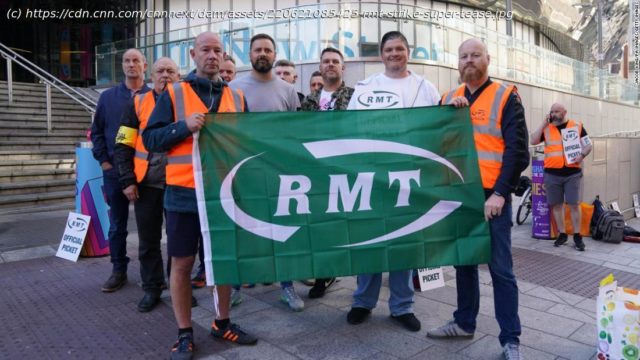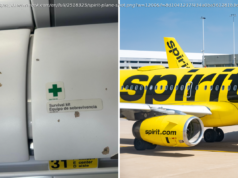The United Kingdom has a jobs problem. There just aren’t enough workers to keep its economy moving forward, and many employees are growing angry about inflation taking a large bite out of their paychecks.
The problem escalated Tuesday as thousands of rail workers went on strike over demands for better pay and working conditions — the biggest walkout on the railways in 30 years — bringing large parts of the network to a halt. More strikes are set for Thursday and Saturday. A separate strike by workers on London Underground also halted tube services. The railway strikes could continue for months, the National Union of Rail, Maritime and Transport Workers has said, and teachers, nurses and other workers could walk out as their pay falls behind soaring rates of inflation, now forecast to peak above 11% later this year. Unison, a union representing 1.3 million public sector workers, said last week that it was „strike-ready.“
This month’s rail strikes alone could cost the tourism, leisure and theater industries more than £1 billion ($1.2 billion), Kate Nicholls, CEO of trade body UK Hospitality, told Times Radio last week. A summer of strikes would deal a hefty blow to an economy that has slipped into reverse. But activity was already being held back in industries such as aviation, hospitality and social care because of a record number of vacancies — 1.3 million at the last official count. Mandira Sarkar, owner of Mandira’s Kitchen, a food delivery and catering company in the southwest of England, describes the labor shortage as a „slow death“ for her business of six years.
„It’s been a complete nightmare. [we’re] literally down on our knees as we just can’t seem to find the staff“, she told CNN Business. Yawning worker gaps across industries have limited businesses‘ capacity to grow and is causing some companies to cut back services. Last week, Gatwick, an airport south of London, said it would cut its summer schedule by up to 13% over July and August because it could not find enough workers. The airline industry slashed jobs during the pandemic as demand for travel nosedived, and has struggled to hire and train enough workers to cope with a strong rebound in passenger numbers over recent months. EasyJet (ESYJY), a budget airline, said on Monday that it would reduce its summer schedule to about 90% of 2019 levels due, in part, to the disruption at Gatwick. But it’s not just a hangover of the pandemic. Brexit has ended the free movement of labor between the United Kingdom and Europe, making it much harder for British employers to tap a huge source of workers. Sarkar said that she „desperately“ needs to hire two people to work full time in her kitchen, and blames the twin impact of Brexit and the pandemic for keeping workers away. A lack of staff has forced her to turn away customers, so much so that Sarkar expects her revenues this year to be 40% lower than in 2021.
„All the eastern European people, all the people that we had, who worked for the hospitality industry, have disappeared [during the pandemic], leaving this huge, big gaping hole“, she said.






